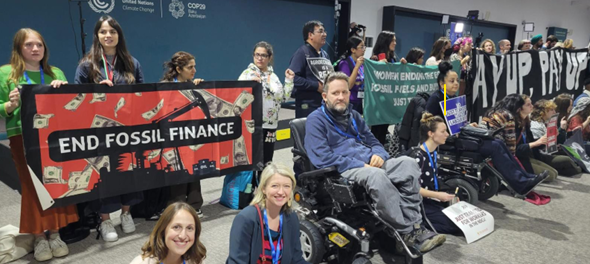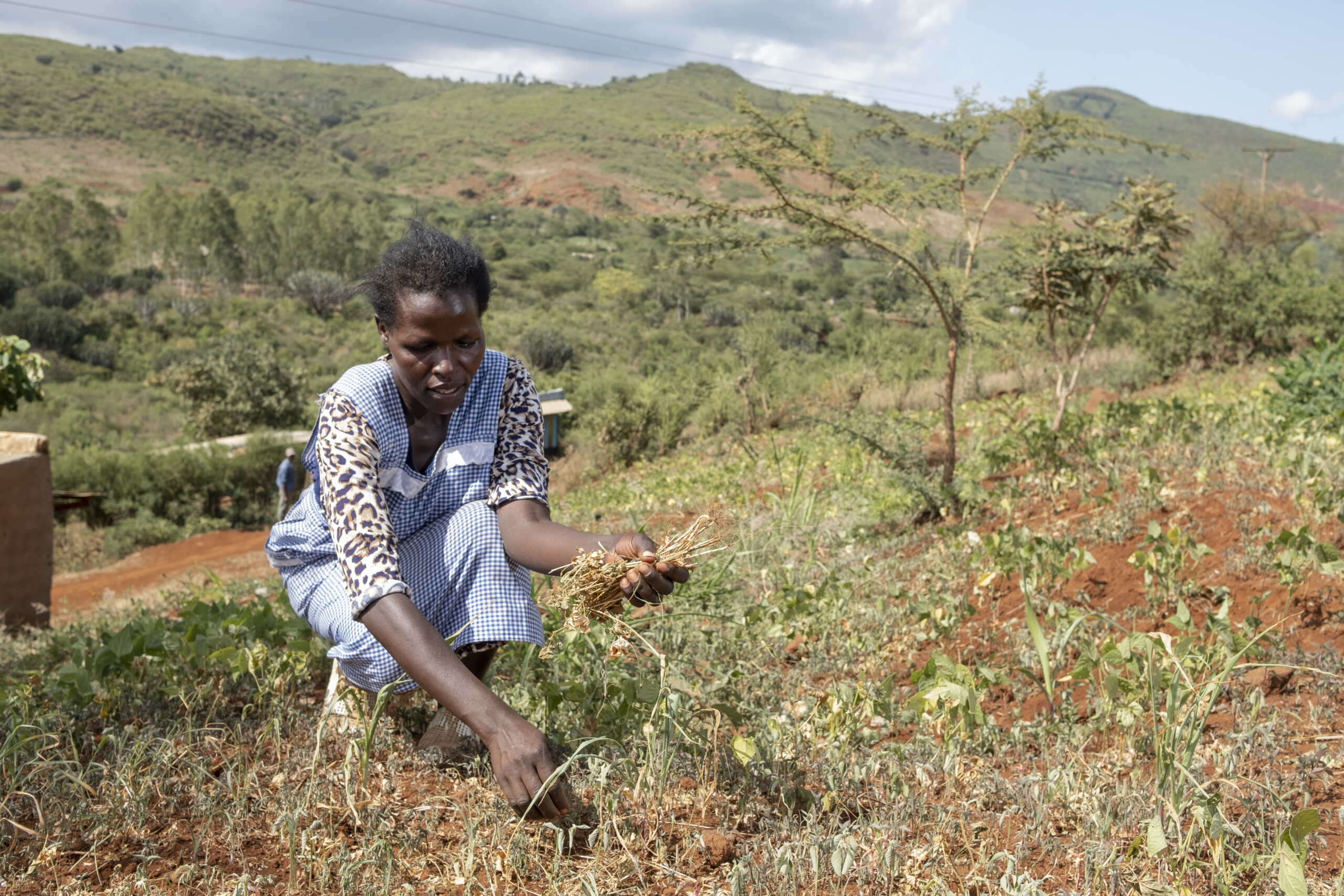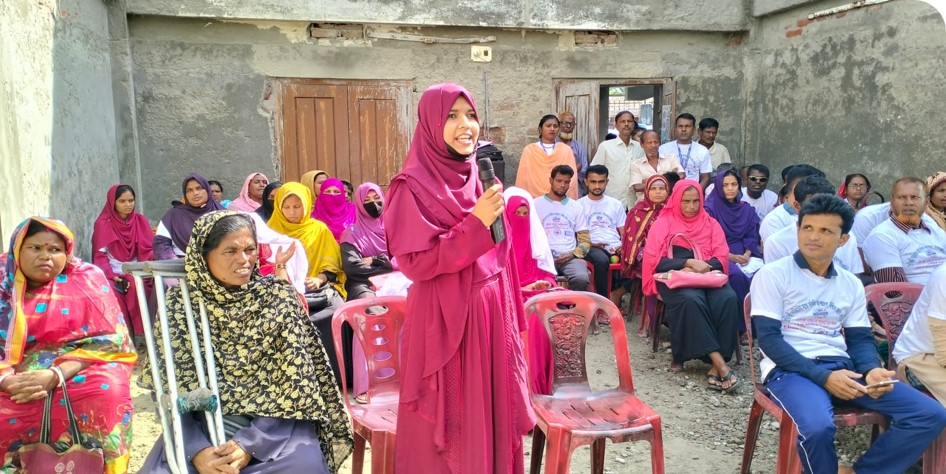6 lessons to move Inclusive Climate Action forward
News | January 16, 2024
This article shares six take-aways from COP26 from our CBM Global team who were at COP: Julian Eaton, Mental Health Director, Christian Modino Hok, Humanitarian Director, and Mary Keogh, Advocacy Director who attended online. The CBM Global team attended COP26 with our CBM UK colleagues, who have shared reflections, see here and our OPD partners, European Disability Forum, see here and International Disability Alliance, see here.

It’s over a week since COP26 finished and we have been reflecting on what we have learnt. COP is vibrant, intense, emotional, and fast paced. It can be frustrating and inspiring in equal measure, depending on who you talk to, who you listen to, and how individual agendas and expectations are favoured and met. COP is what happens in the lobby corridors, in the side events, in the press rooms, on the streets, and on social media to influence decisions at the negotiating table. Everybody wants to have their voices heard, loud, and clear. The heat is on, time is running out. Everybody wants more unambiguous, quick, and bold political, economic, and social actions to bring solutions to the threat of global warming; real, tangible, and concrete commitments to mitigate the impact of climate change on the already extremely vulnerable ecosystems that ultimately sustain peoples’ lives, and most specifically, on the most at-risk and poorest countries and communities who are already bearing the largest burden of what is now, the worst crisis humanity will have to face in the decades to come. Climate change is everybody’s business.
So what have we learnt and committed to move Inclusive Climate Action forward?
It is not all about carbon. We recognise that it is the achievement of as low a temperature rise by end of century as possible that will have the biggest impact on people’s lives in the mid- to long-term. However, we know that climate change is already severely affecting communities around the world, particularly those contributing least to the problem. Dealing with Climate Change is therefore about social justice, addressing inequalities and putting human rights at the centre of the debate and the action, something that COP 26, disappointingly, failed to address consistently. The appointment of the UN special rapporteur on promotion and protection of human rights in the context of climate change and the commitment by the UN Special Rapporteur on Disability rights to include climate change as part of his work portfolio provides great momentum to keep this on the policy making agenda. CBM Global will keep advocating for inclusive climate action and climate justice by supporting bringing the voices, knowledge and expertise of organisations of persons with disabilities to the global efforts to tackle Climate Change.
The injustices inherent in climate change impacts must be addressed. Given the unequal contribution made to causing climate change, a broad coalition is supporting demands from the most affected countries for appropriate financing of adaptation measures to reduce the risk for populations, as well as funds to recompense loss and damage caused by climate impacts. Within countries, financial support must also be targeted towards those most affected, who are often groups already marginalised by poverty, disability, or other causes. CBM Global is joining with voices seeking international climate justice and holding to account those who have made promises so that committed funds are delivered.
The climate crisis will shape the humanitarian and development agendas. Over the next 30 years, the climate crisis is going to dominate the humanitarian/ development narratives. New reports and analysis suggest that the humanitarian sector must move from Conflict Humanitarianism to Climate Humanitarianism. It is likely that future conflicts will be triggered by climate migration, displacement, and control and access to natural resources. The humanitarian and development sectors have to come together to work on anticipatory actions to strengthen community resilience through more inclusive and locally led crisis preparedness. CBM Global is making Inclusive Climate Action a core pillar of its work, informing its development and humanitarian programmes through enhanced research and analysis of the impact of climate change on persons with disabilities.
Change comes from collaboration. Influencing policy change at a national level and an international level takes genuine cooperation and collaboration among organisations representing persons with disabilities, INGOs, academia and also governments. Disability Inclusive Climate Change will not come through anyone intervention, it will come through a strategic coalition of OPDs, INGOs and grass root organisations working together. We believe that a representative disability constituency can support delivery of this change. CBM Global will continue to pursue an authentic partnership with OPDs and INGOs to promote inclusion and rights-based approaches to climate action, mindful that persons with disabilities will remain disproportionately affected by the impact of Climate Change
Access and inclusion cannot be tokenistic. We saw significant and well justified criticism levelled at COP organisers for lack of accessibility, ranging from senior level politicians not accessing the first day of COP, to deaf people not having access to international sign, and lack of captioning on streamed events. The UNFCCC is part of the UN family and as such is governed by the UN Disability Inclusion Strategy which commits to ensuring the full and equal participation of persons with disabilities in UN led activities. Accessibility and inclusive meetings are a precondition for this to happen, are a basic human right for persons with disabilities and COP26 has failed in delivering this. As part of its long standing relationship and ongoing collaboration with UN agencies, CBM Global in partnership with OPDs will continue working with the UN family to fulfil its inclusion commitments and we call on COP 27 organisers to make sure accessibility standards are met at the next conference.
Representation cannot only be about the participation of Northern Civil Society Organisations. Whilst COP organisers claimed that COP26 would be the most inclusive conference ever, it has been labelled by some environmental groups as one of the whitest in years. COP 26 sadly lacked CSO participation from countries that are impacted most by climate change. Factors such as vaccines and quarantine measures prevented participation for many CSOs but even in times without COVID, we know that many stakeholders who can bring a personal experience of living at the frontline of the crisis cannot normally attend due to costs and barriers to mobility e.g. visas etc. The success of these conferences cannot only be measured by the outcomes of the negotiations and final written agreements but also by the opportunities given by those most affected to bring their stories and wisdom so they continue shaping, influencing and inspiring the actions of all.
https://cbm-global.org/news/6-lessons-to-move-inclusive-climate-action-forward
Related News

One in Five Is Not Enough: The gains on Disability Inclusion have not gone far enough
One in Five Is Not Enough: The gains on...

COP30 Is a Turning Point for Disability-Inclusive Climate Action
As the world gathers in Belém, Brazil, from 10–21 November 2025 for COP30, the message from...

Achieving resilience for all requires funding disability inclusion in DRR
On International Day for Disaster Risk Reduction (DRR) 2025,...
